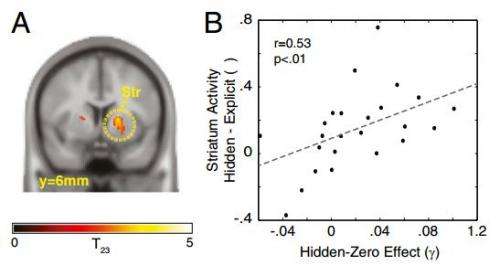Brain activity related to valuation and exertion of willpower were both influenced by choice framing. (A) Activity in reward-related dorsal and ventral striatum was greater for choices made in the hidden-zero than the explicit-zero frame. (B) Differences in striatal activity across framing formats correlated with individual differences in the size of the behavioral framing effect. Credit: (c) PNAS, doi: 10.1073/pnas.1408991111
(Medical Xpress)—Do you want to avoid chocolate until you've lost weight or leave your savings in the bank earning interest rather than splurge on an expensive gadget? You might think using willpower is the best way to control yourself and avoid temptation. In the Proceedings of the National Academy of Sciences, Eran Magen at the University of Pennsylvania in Philadelphia and his team report that thinking about your choices in a different way can be a more effective means of achieving self control than using willpower.
Magen and his team looked at two potential methods of encouraging delayed gratification.The first, willpower, involves consciously delaying rewards, despite distractions and temptations, in order to achieve a better outcome. Using willpower can be very demanding. Therefore, it is often ineffective. The second method involves rewording the description of possible outcomes. The researchers thought this method would be more effective, because it would create a more automatic change in behavior.
To test this theory, the team performed an online experiment in which they asked 182 volunteers to choose between receiving a small amount of money that day or a larger amount later. They phrased the question in two ways. With some subjects, they used a "hidden-zero" format, asking, for example, "Would you prefer to receive $6.00 today or $8.50 or in 46 days?" An "explicit-zero" format was used with the other subjects, with the question phrased as, "Would you prefer to receive $6.00 today and $0 in $46.00 days, or $0 today and $8.50 in 46 days?" The researchers found that subjects who responded to the explicit-zero format question were more inclined to delay their reward than those who answered the hidden-zero format question were.
Magen's team then asked 23 volunteers similar questions. These volunteers received fMRI scans. The team found that activity in regions of the brain associated with rewards, the dorsal and ventral striatum, was higher when subjects made choices based on questions in the hidden-zero format than when they made choices based on questions in the explicit-zero format. Of the subjects that chose delayed rewards, those that responded to hidden-zero format questions experienced greater activity in the dorsolateral prefrontal cortex, a brain region associated with willpower, than subjects who answered explicit-zero format questions. These findings suggest that the subjects who answered questions presented in the hidden-zero format were working harder to control themselves.
The researchers note that self control correlates with good health and with financial, academic and social success. They believe that by reframing choices, experts in a variety of fields, including public policy, could enable people to apply more self control throughout their lives, deferring instant gratification in favor of achieving long term goals.
More information: Behavioral and neural correlates of increased self-control in the absence of increased willpower, Eran Magen, PNAS, DOI: 10.1073/pnas.1408991111
Abstract
People often exert willpower to choose a more valuable delayed reward over a less valuable immediate reward, but using willpower is taxing and frequently fails. In this research, we demonstrate the ability to enhance self-control (i.e., forgoing smaller immediate rewards in favor of larger delayed rewards) without exerting additional willpower. Using behavioral and neuroimaging data, we show that a reframing of rewards (i) reduced the subjective value of smaller immediate rewards relative to larger delayed rewards, (ii) increased the likelihood of choosing the larger delayed rewards when choosing between two real monetary rewards, (iii) reduced the brain reward responses to immediate rewards in the dorsal and ventral striatum, and (iv) reduced brain activity in the dorsolateral prefrontal cortex (a correlate of willpower) when participants chose the same larger later rewards across the two choice frames. We conclude that reframing can promote self-control while avoiding the need for additional willpower expenditure.
Journal information: Proceedings of the National Academy of Sciences
© 2014 Medical Xpress























